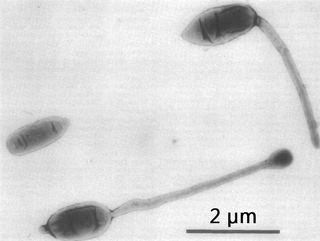
The Hyphomicrobiaceae are a family of bacteria. Among others, they include Rhodomicrobium, a genus of purple bacteria.

Aeromonas is a genus of Gram-negative, facultative anaerobic, rod-shaped, bacteria that morphologically resemble members of the family Enterobacteriaceae. Most of the 14 described species have been associated with human diseases. The most important pathogens are A. hydrophila, A. caviae, and A. veronii biovar sobria. The organisms are ubiquitous in fresh and brackish water.
Aeromonas australiensis is a Gram-negative, anaerobic bacterium from the genus Aeromonas isolated from an irrigation water system in Western Australia.
Aeromonas bivalvium is a Gram-negative, oxidase- and catalase-positive, motile bacterium with a polar flagellum of the genus Aeromonas isolated from bivalve molluscs.
Aeromonas caviae is a Gram-negative bacterium of the genus Aeromonas isolated from epizootic guinea pigs.
Aeromonas diversa is a Gram-negative, facultative anaerobic bacterium of the genus Aeromonas isolated from the leg wound of a patient in New Orleans.
Aeromonas eucrenophila is a Gram-negative bacterium of the genus Aeromonas isolated from fresh water and infected fish. A. eucrenophila is a pathogen of fish, and it causes diarrhoea in humans.
Aeromonas fluvialis is a Gram-negative, oxidase- and catalase-positive, facultatively anaerobic, non-spore-forming bacterium of the genus Aeromonas isolated from water from the Muga River in Girona in northeastern Spain.
Aeromonas jandaei is a Gram-negative bacterium of the genus Aeromonas isolated from human feces in Oregon.
Aeromonas molluscorum is a Gram-negative, oxidase- and catalase-positive, motile bacterium with a polar flagellum of the genus Aeromonas which was isolated from bivalve molluscs.
Aeromonas piscicola is a Gram-negative, catalase and oxidase-positive bacterium of the genus Aeromonas isolated from diseased fish in Spain
Aeromonas popoffii is a Gram-negative bacterium of the genus Aeromonas isolated from drinking water production plants and reservoirs in Oelegem, Belgium, and in Scotland.
Aeromonas rivuli is a Gram-negative, oxidase- and catalase-positive, non-spore-forming bacterium with a polar flagellum of the genus Aeromonas isolated from Westerhöfer Bach in Harz in Germany.
Aeromonas sanarellii is a Gram-negative, oxidase- and catalase-positive, non-spore-forming bacterium of the genus Aeromonas isolated from wounds of patients in a hospital in Taiwan.
Aeromonas simiae is a Gram-negative, oxidase- and catalase-positive motile bacterium of the genus Aeromonas, with a polar flagellum, isolated from the faeces of a healthy monkey.
Aeromonas taiwanensis is a Gram-negative, oxidase- and catalase-positive, non-spore-forming, motile bacterium of the genus Aeromonas isolated from wounds of patients in Taiwan.
Aeromonas tecta is a Gram-negative bacterium of the genus Aeromonas isolated from stool of a child with diarrhoea, a healthy patient, and environmental sources.
Aeromonas aquatica is a bacterium from the genus Aeromonas which has been isolated from a humic lake in Haukkajärvi in Finland.
Aeromonas lacus is a bacterium from the genus Aeromonas which has been isolated from a humic lake in Huutjärvi in Finland.
Aeromonas rivipollensis is a Gram-negative, facultatively anaerobic, rod-shaped and motile bacterium from the genus Aeromonas which has been isolated from river sediments from the Ter River in Spain.

